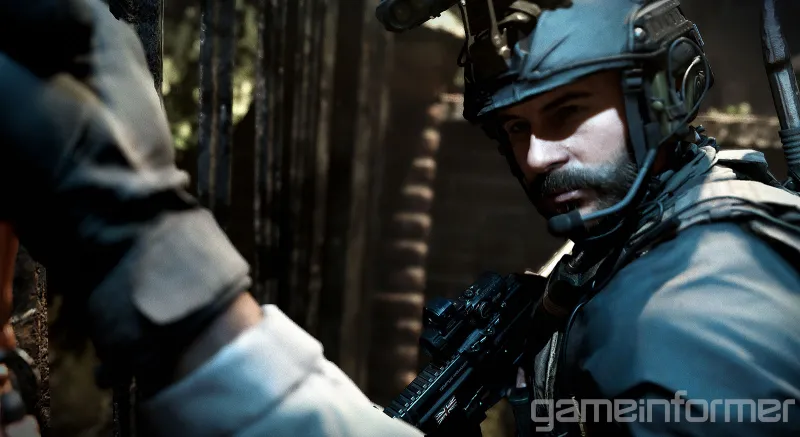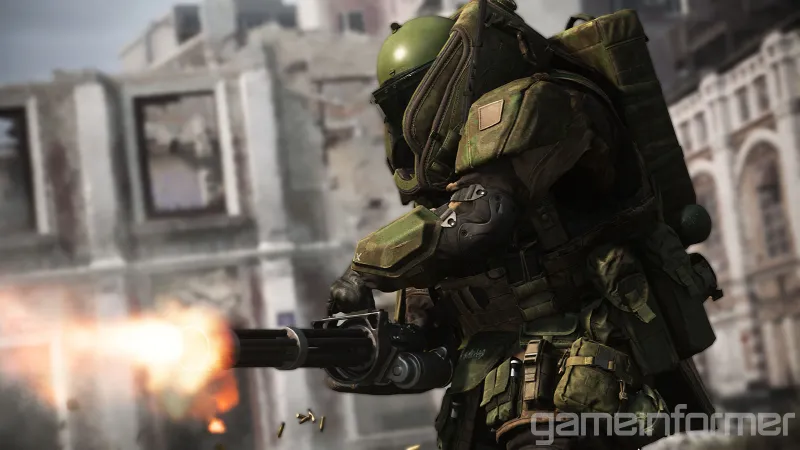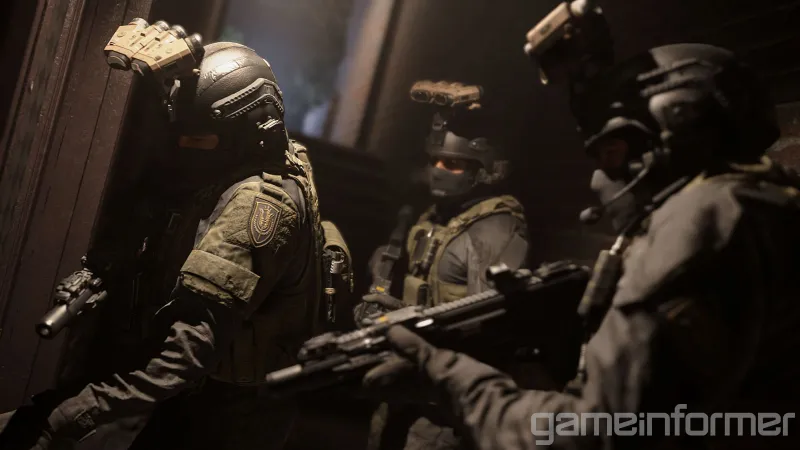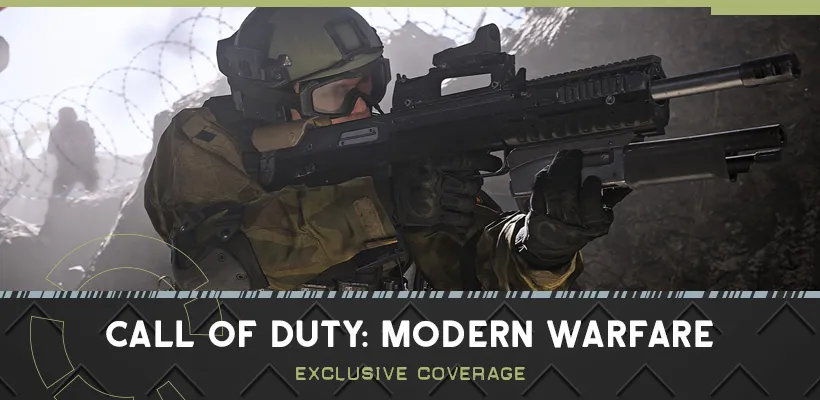


Following a dispute with Activision over Call of Duty: Modern Warfare 2 royalties, Infinity Ward co-founders and figureheads Vince Zampella and Jason West were unceremoniously removed from the studio. The two went on to form Respawn Entertainment and created the Titanfall series. Several key members of the Infinity Ward team that worked on games like Call of Duty 2, Call of Duty 4: Modern Warfare, and Call of Duty: Modern Warfare 2 followed Zampella and West to Respawn, leaving a vastly different team to work on Modern Warfare 3 and subsequent titles.
However, over the last couple of years, an interesting trend has emerged: Several of those departing members are back at Infinity Ward. It began with former art lead Joel Emslie, who served as art lead on Titanfall and Titanfall 2, and continued with former designer Geoff Smith, lead animator Mark Grigsby, and a few others.
Emslie’s motivation was driven by his love for Counter-Strike, which made him want to come back to more grounded combat. “I remember a point in time when I was just getting exhausted by all the wall-running and jetpacks and the palette and that stuff,” Emslie says. “The industry’s kind of moved that way; there’s a lot of that going on. I guess for me, I saw Call of Duty: Modern Warfare Remastered, and I started having these thoughts in my head. I really missed that. I missed that setting, I missed that genre, I missed that type of gameplay, that immersive environment, because it looks real to me. I missed that.”

At this same time, serendipitously, Infinity Ward studio director Dave Stohl reconnected with Emslie at a work function. Stohl told Emslie that if he ever wanted to come back to Infinity Ward, the team had a spot waiting for him. This got Emslie’s wheels turning. “Basically, I told him, ‘What if I finish out my current project and do my job to the best of my ability, and then we’ll talk?’” Emslie recalls. “Once I got to that point in time, I guess it was like Christmas vacation 2016, I looked at Remastered and I looked at Infinite Warfare and I was like, ‘Man, the production value of this game… there’s so much potential and this new engine [for Modern Warfare 2019] was five years in development. Parts of that engine were alive and well in Infinite Warfare, and you could see it.”
Though he hadn’t heard any rumors or spoken to any Infinity Ward employees, Emslie had a weird feeling that the studio was planning on revisiting Modern Warfare. “I said, ‘If you’re thinking of doing a new Modern Warfare game, I’m really interested,’” he says. “I wasn’t NDA’d so he was kind of hesitant, but he said, ‘Yeah, we’re thinking about it.’ And I went, ‘I’m really serious now. I’d love to be a part of that.’ Modern Warfare was, no doubt, some of the best development years of my life.”
Emslie made the call to pack his bags and leave Respawn Entertainment to return to Infinity Ward. But it wasn’t going to be as easy as a simple farewell. Emslie had worked with the team at Respawn for around seven years – even longer for the ones who defected from Infinity Ward alongside him – so saying goodbye was a hard process.
“I made sure to go and say goodbye to every single person in the studio the day that I left,” Emslie says. “I did a quick exit because I didn’t want to linger around. It was like breaking up with 60-plus people. Yeah, there were hurt feelings. There were people who were really shocked and surprised. I feel like I gave it a really good go. I never held back. I was there for seven years almost and I always went for it as hard as I possibly could. I could see the trajectory that they were on and I wanted to try something new. That was surprising to some people, and there was a period of people not completely understanding my reasoning, and then not talking.”

Soon, others followed, and the rest of the studio began to notice a trend. While the preexisting team was excited to see some of these familiar faces reenter the mix, co-studio head Patrick Kelly recalls some mixed emotions.
“I think people were very excited, I think they were a little anxious,” Kelly says. “They weren’t sure what that would mean in terms of culture and whatnot of the studio. A little nervous because, for all of us around the franchise, when we’ve made these games, you end up naturally comparing so much of what gets done critically against some of the work these guys did.”
“We had some friction in the beginning,” Emslie adds. “We had to find our way, but I think it worked out because everybody… there’s a thing in life where you either choose to be a dick or don’t be a dick. It can happen in traffic or it can happen at work with people you work with. Don’t be a dick.”
With a palpable mix of excitement and anxiety in the studio, Emslie wanted to unlock the team’s full potential. Shortly after his return, he went around the entire studio and got to his Infinity Ward team members. Emslie credits Kelly for enabling the team to be optimized and become a higher-performing studio. “I found people from all walks of life doing different things and doing, all in their own way, cutting-edge things,” he says. “What we’re looking is the studio is really working at a level I’ve never seen before, because we unlocked this potential that was here.”
Emslie was happy in his new role back at Infinity Ward, but he wasn’t about to try and lure others away from Respawn. “It had to be just like it was when we left: It really had to be your own decision,” he says. “That’s important because I would never want to go someplace, then tell a bunch of my friends and sell them on an idea, then have them show up and it not work out. In that respect, you have to let people make their own decision. I was the first to come over here, and I basically think that piqued people’s interest.”

With their interests piqued by Emslie’s leap, Grigsby and Smith began thinking about making a move of their own. As Smith began weighing his options, he had to think a lot about what this would mean for him and his family. “It’s a hard thing to do, but when you have that passion for a project you know you could sink your next three years into. When the passion hits you, you have to go with it, I think,” he explains. “The reason I ended up coming back, my dad was in the Marines for 30 years, so modern military things hold a pretty dear spot. We left with more stories to tell and more things we want to do.”
Emslie, Grigsby, and Smith left Respawn to come back to Infinity Ward, but they hold no animosity toward the Titanfall developer, with Emslie even going out of his way to say that Apex Legends, the first major project from the studio following his departure, was “brilliant.”
“The only animosity I have is that my product has to be better than yours!” Grigsby says laughing. “Competition. That’s it. Friendly competition.”
While these three former Respawn developers were interested in returning to Infinity Ward for their own reasons, they all knew it was the right call following a meeting with Kelly. “He has a kindred spirit to what we all are passionate about, which is being number one,” Grigsby says. “It was a passion thing that it’s all similar to us.”
Similarly, Kelly was impressed by the enthusiasm and intensity Emslie, Grigsby, and Smith brought to the initial conversations. “They were so bold about what their aspirations were, which was another way of them saying, ‘This better not be some formulaic thing in any way,’” Kelly says.
Kelly also loves how the returning team members were so unafraid to show that passion and quickly introduced new ideas and approaches to creating a Call of Duty game. “I think it’s very easy, especially with something as successful as Call of Duty has been historically, to find yourself in a rut where you’re all doing these things because these things have worked,” he says. “These guys come back in and they’ve got so much energy. They had all of these ideas and thoughts and energy and, obviously, credibility.”

As Infinity Ward began work on this year’s Call of Duty: Modern Warfare, it felt like a convergence of talent the likes of which the studio had never seen. In addition to Emslie, Grigsby, Smith, and the other Respawn developers, Naughty Dog alumni Jacob Minkoff and Taylor Kurosaki joined the team prior to Infinite Warfare. To top it all off, the studio brought Zied Rieke, a pivotal member of the team for every Call of Duty up to Modern Warfare 2, back as gameplay director.
Coincidentally, Rieke had done stints at Respawn Entertainment and Naughty Dog, giving him a culminative perspective for all these developers coming to the studio. He had worked on Uncharted 4 with Minkoff and Kurosaki, and when they left, they urged Rieke to come back to Infinity Ward and work with them there. “He was a tough guy to pry back over here, but he’s like the CODfather, so you have to have him on the project,” Kurosaki says.
Now, with a team that combines old with new, the studio is focused on finishing Call of Duty: Modern Warfare, something that, on its own, energizes the team.
“I think that maybe deep down, wherever these people started and where they came from, what drove them to come to the studio was the Modern Warfare series,” Smith says. “They haven’t had the opportunity to work on that. And I feel like when we started working on this, slowly but surely, everybody started kind of coalescing into, ‘Holy crap. We’re making a Modern Warfare game!’ You could just see the smiles in the hallways, and we’d have these milestones and these little victories and it’s starting to get there and it’s building and building, and people would just walk down the hall with a bit bigger smile and people were putting in some extra hours. I think all the talent they needed was here. Maybe we pushed them in one direction or another, but I think it’s the Modern Warfare title that brought everybody together.”
It's clear the pieces are in place, but how they fit together will ultimately determine the success or failure of this merging of talent. We’ll see how well this newly energized team truly comes together when Call of Duty: Modern Warfare launches on October 25.
To learn more about Call of Duty: Modern Warfare, click on the banner below and check out our full month of coverage.


Explore your favorite games in premium print format, delivered to your door.